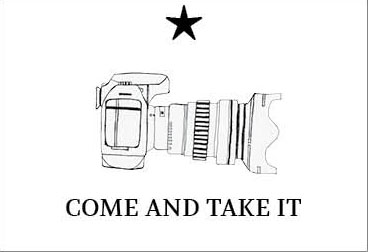TX Rep.’s attempt to limit documenting police activity prompts questions from media
By Kate Rhoads
Managing Editor

There is a distinct line between photography that impedes police activity and that which does not. That line is 15 feet away, according to Texas Representative Jason Villalba. On March 10, Villalba introduced House Bill 2918, which would make it a Class B misdemeanor for citizens to photograph or film police officers from within 15 feet, according to the amended version.
His reason? “We’re trying to keep agitators and people who are … disrupting [police officers’] ability to keep our community safe from that little zone,” Villalba said.
Whoa, hold up. What about Title 8, Chapter 38 of the Texas Penal Code, which already makes it a Class B misdemeanor to “interrupt, disrupt, impede, or otherwise interfere with a peace officer while the peace officer is performing a duty”? If there is already legislation protecting law enforcement from public interference, why do we need a law specifically restricting photography, filming or documenting?
That’s exactly what I asked Villalba via Twitter: “@ JasonVillalba If Title 8, Ch. 38 of the TX Penal Code already makes it illegal to i m p e d e police activity, why is HB 2918 needed?”
The Republican representative of District 114 swiftly responded by blocking me from his Twitter profile. Seems like he doesn’t really know why HB 2918 is needed, either. What followed was a tsunami of tweets from local and national journalists, photographers and activists criticizing Villalba’s knee-jerk reaction. And he blocked them, too – many of whom were legitimate journalists and educators expressing genuine concerns.
Twenty-four hours later, I was unblocked and offered a rare interview with Villalba at the Capitol building in Austin. He said he initiated the Twitter blocks and took down his state Facebook page in response to nasty messages and death threats against him and his family related to HB 2918. “The idea wasn’t to shut down legitimate news sources,” Villalba said. “I was just getting overwhelmed.”
He added that he hopes to reengage in discussion as the situation blows over. As for HB 2918, Villalba is still bent on passing the bill, according to an interview on texastribune. com. However, it seems he has started down a spiral of amendments, refusing to throw the whole thing out and leaving behind a string of questions.
First of all, the bill’s definition of “media” has huge implications for freelancers and citizen journalists. Not only do they have a right to document law enforcement’s public actions, but their jobs sometimes demand it. Although this bill tries to strike a balance between police protection and the media’s rights guaranteed under the First Amendment, freelancers’ concerns are often left hanging in the balance.
Second, modern technology brings up additional issues, such as whether the 15-foot limit applies to cameras on drones, selfie sticks or monopods. “I would imagine that that would be prohibited,” Villalba said, “but the legislation doesn’t contemplate that kind of technology.”
Third, there are bound to be complex situations in which the law would prove fuzzy. Small places, such as offices, hallways or the middle of a crowd, could easily be less than 15 feet wide. This law would entirely prohibit citizens from documenting police officers’ actions within those spaces. “We always understood that when you have legislation like this, there’s going to be some glitches,” Villalba said.
Fourth, the Supreme Court has repeatedly ruled in favor of an ordinary citizen’s right – not only media’s right – to record police activity. In Glik v. Boston, the court observed :“The First Amendment goes beyond protection of the press and the selfexpression of individuals to prohibit government from limiting the stock of information from which members of the public may draw.”
This right of the public is crucial in keeping law enforcement accountable and maintaining a free country even when the individual filming expresses disagreement with a police officer’s actions.
The Supreme Court ruled in City of Houston v. Hill: “To oppose or challenge police action without thereby risking arrest is one of the principal characteristics by which we distinguish a free nation from a police state.”
Not to mention the absurdity of criminalizing the act of pressing a button on a camera to take a picture, which is what this law boils down to. @AGuyInTexas tweeted, “Why is taking pics at 10ft a problem and standing there watching at 10ft isn’t?” To which Villalba responded, “Lights and cameras can be misconstrued in the dark as weapons.”
First, as @TheBrownFolder pointed out, a lot of handheld objects can be mistaken in the dark as weapons. Second, someone wearing a body camera or Google Glass can be doing the same exact thing as someone just standing and watching, the only difference being the equipment’s recording of the scene. Yet, one person is breaking a law by standing and recording, while the other is not by just standing.
I understand Villalba’s intention to limit interference when a police officer is in the middle of handling a situation, but it seems HB 2918 raises more questions than answers.
As Mickey Osterreicher, a lawyer for the National Press Photographers Association, said, “It basically was a solution in search of a problem.”






